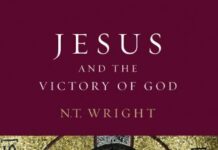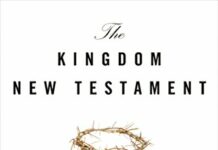
Ebook Info
- Published: 2005
- Number of pages: 146 pages
- Format: PDF
- File Size: 0.00 MB
- Authors: N.T. Wright
Description
While showing how both evangelicals and liberals misread Scripture, a leading Bible scholar and Anglican bishop shows how to restore the Bible’s authority today for guiding the church through its many controversies.
User’s Reviews
Editorial Reviews: From Publishers Weekly What do people mean when they say they believe the Bible is the “Word of God”? And why should they be at war with each other over the role of the Bible in the life of the church? Wright, an Anglican bishop and author of Jesus and the Victory of God, believes the church needs to re-examine the Bible’s role in the life and piety of its people. Surveying biblical and contemporary history, he explains how the Bible, and the church’s understanding of it, have been affected by the complex interplay of religion with reason, tradition, politics and culture. In true Anglican style, Wright takes a middle road between evangelical insistence on biblical inerrancy and the modernist tendency to dismiss biblical authority as an expression of “anti-intellectual pre-modernity.” His final chapter, entitled “How to Get Back on Track,” prescribes a path that integrates scripture more fully into the life of the church, proclaiming the Bible in such a way that it refocuses the believing community whose central focus is “the goal of God’s kingdom.” Wright offers sensible insights on the transforming power of God, very necessary in these times of skepticism and confusion. (Dec.) Copyright © Reed Business Information, a division of Reed Elsevier Inc. All rights reserved. Review “Wright appeals to the reader to take another look at the Bible, not as an isolated phenomenon―a veritable rule book similarly applicable at all times and in all places―but rather as a book better placed within both the contemporary cultural context and as part of a larger tradition of interpretation.” — Explorefaith.org“Wright is a provocative theologian… there is so much here that you will wish that it were longer– but its brevity makes for easy reading and it certainly deserves to be read.” — Church of England Newspaper“N. T. Wright opens for us a path beyond of the paralyzing polarization of “liberal” and “conservative.” — Brian McLaren, author of A New Kind of Christian“[P]robing, provocative, insightful…This is a book of uncommon wisdom for all who read and love the Bible.” — Timothy George, Dean of Beeson Divinity School of Samford University and Executive Editor of Christianity Today“This wide-ranging whirlwind-tour account of Scripture channeling God’s authority, with its tweaking of distortions back into shape and its first-class approach to Bible study, is masterly throughout.” — J. I Packer, Professor of Theology, Regent College“In a fashion that is both old fashioned and new fangled at the same time Bishop Wright takes us through a sane and helpful study of what it means to treat the Bible as the authoritative Word of God. Highly Recommended!” — Ben Witherington, author of The Brother of Jesus“The best book of its kind available.” — The Christian Century“The whole book gives further cause for gratitude for God’s gift of Wright to his Church.” — ANVIL“Written by one of the leading Christian thinkers in the world today, this book is a refreshing and accessible resource concerning the perennial question of biblical authority that moves the discussion beyond the liberal-conservative impasse of our times. Highly Recommended.” — John R. Franke, Professor of Theology, Biblical Theological Seminary“Scripture and the Authority of God is a fabulous book. With characteristic verve and occasionally pungent grace… Scripture and the Authority of God could be the beginning of a more faithful listening, as well as sustaining more fruitful conversation about the nature of biblical interpretation.” — Books&Culture“Wright offers sensible insights on the transforming power of God, very necessary in these times of skepticism and confusion.” — Publishers Weekly From the Back Cover “But what does Scripture say?” That question has echoed through a thousand debates in the life of the worldwide church in recent decades. All Christian churches are officially signed up to strong statements about the centrality of Scripture and its authority in their mission, life, doctrine, and discipline. But there is no agreement on what this might mean and how it might be worked out in practice. N. T. Wright, Bishop of Durham and widely respected Bible and Jesus scholar, gives new life to the old, tattered doctrine of the authority of Scripture, delivering a fresh, helpful, and concise statement on the current “battles for the Bible,” and restoring Scripture as a place to find God’s voice. Removing the baggage that the last 100 years of controversy and confusion have placed on this doctrine, he renews our confidence in the Bible, and shows that the Bible can still be an authority that guides our lives. About the Author N.T. Wright is Bishop of Durham and was formerly Canon Theologian of Westminster Abbey and dean of Lichfield Cathedral. He taught New Testament studies for twenty years at Cambridge, McGill, and Oxford Universities. Wright’s full-scale work, Jesus and the Victory of God, is widely regarded as one of the most significant studies in the contemporary Third Quest of the historical Jesus. It follows The New Testament and the People of God as the second volume in his projected six-volume series entitled Christian Origins and the Question of God. Among his many published works are: The Challenge of Jesus, The Meaning of Jesus (coauthored with Marcus Borg), and What Saint Paul Really Said. Read more
Reviews from Amazon users which were colected at the time this book was published on the website:
⭐I am conservative, Reformed, and Evangelical in my theological and spiritual underpinnings. Anytime I agree with Brian McLaren then it is a bit unusual at best. But he and I both agree that this is a very useful, informative and challenging book. Although I wonder if McLaren really paid attention to what Wright says.In this book Wright challenges the church to a return to the Lord’s authority working through scriptures as the pathway to revitalization and empowerment. He calls for a balanced perspective which understands “tradition” (present in every communion) as the Church’s dialogue with scripture over the years but which, as dialog, is to be respected, understood and continued, but not to the extent of blinding us to where tradition itself needs critiquing and perhaps augmentation.He calls for a living, re-orientation to Scripture as THE means by which the Lord authoritatively directs His church through the ages, including this one. In doing so he directs us away from a modern & post-modern tendency to reduce scripture to a “back ground buzz which we use to give a spiritual flavor and “baptism” to our own cherished ideas about how the God’s business is to be accomplished. He actually calls for Bishops (my tradition doesn’t have those) to get back to the primary business of actually teaching scripture and relegating other “bureaucratic” tasks to secondary or less status. I found this willingness to critique his own peers very refreshing.Wright makes a major contribution in reminding us that we need to be governed by an historical perspective (time and place) in our own self-understanding of the Church, its place in the “story” of God’s saving work in the world. He, like most who push this emphasis, falls a bit short on communicating exactly how this understanding is to avoid an essential relativism between the ethics of the various phases of this meta-narrative. In this book he is better than most in that regard.This book is well worth reading. For those new to Wright it is a good intro to his thinking. To those of us who have read his other works, this book is a good refresher and in many ways, a clarifying over-view of some of his more important thought.
⭐I love how in-depth into the covenant N. T. Wright goes. It is a page-turner for sure. This book is a breath of fresh air in the sea of morass preaching and teaching that is on show these days. If you want to see someone show the glory of God as revealed in the scriptures, this book is for you.
⭐Wright once again comes through with a very thorough and balanced review of the topic. He definitely deserves all of the accolades he receives as a New Testament “expert”.I felt the book did a wonderful job of dissecting the concepts of scriptural authority. Wright provided a number of very useful insights. I would strongly recommend the book to any serious student of scripture, not as the “last word” but as another source to consider.The only negative was that I felt myself wanting to hear Wright take a firm, definitive stand on the issues. The book ends without “closure”; Wright intentionally leaving the reader to decide for themselves how far to take his arguments without really indicating how far he himself believes they should go. That can be both good and bad. but in this particular case, after hearing all sides of the various arguments, and being led down a particular path (but warned not to take that TOOOOOO far), you are left wanting to know how far he thinks is too far, a question he never really answers.I would recommend the book for those interested in the concepts of scriptural authority, but I certainly would NOT make this the only book I read on that subject. It deserves to be considered along with other opinions and writings.
⭐Tom Wright wrote an article “How can the bible be authoritative” for Vox Evangelica in 1991. This book flushes out the themes in more detail and provides some more historial context. The title might be a bit misleading since a “new understanding” could mean recovering an older understanding. My perspective is that the title is not as alarming as it sounds. What I have always appreciated about Tom Wright is that he is able defend his orthodox christian views using rigorous academic methods. Sure, he is often critized by both sides. So the conservative christians accuse him of not being fully orthodox, while the academics accuse him of compromising his rigor due to his personal faith. Regardless of one’s theology position, this book should be a worthwhile read. A more detailed treatment is contained in “NT and the people of god”. It is only in my second reading that I am appreciating and starting to understand the book. So for those of you who would like more depth, I would recommend “NT and the people of god”. If you are interested in the subject of the authority of scripture, you might also be interested in reading more on narrative theology and the emerging/emergent church movement.Happy reading.
⭐NT Wright is quite provocative in his writings. I’ve been sitting at the good Bishop’s feet for a few years now. Not everything he writes I agree with, but this book, though small, has a huge power punch to it.This book is about how to read and understand Scripture. It is by no means an exhaustive book on hermeneutics, but it gets at the very core of what any hermeneutic text is trying to achieve: How does Scripture communicate the Authority of God?NT Wright will teach you how to discover the Authority of God in Scripture. He will also tell you What that Authority of God looks like.I highly recommend this volume by NT Wright. Five stars, I say.
⭐The book was as expected and was sent out quickly.
⭐Just what I needed to complete my essay.
Keywords
Free Download The Last Word in PDF format
The Last Word PDF Free Download
Download The Last Word 2005 PDF Free
The Last Word 2005 PDF Free Download
Download The Last Word PDF
Free Download Ebook The Last Word




